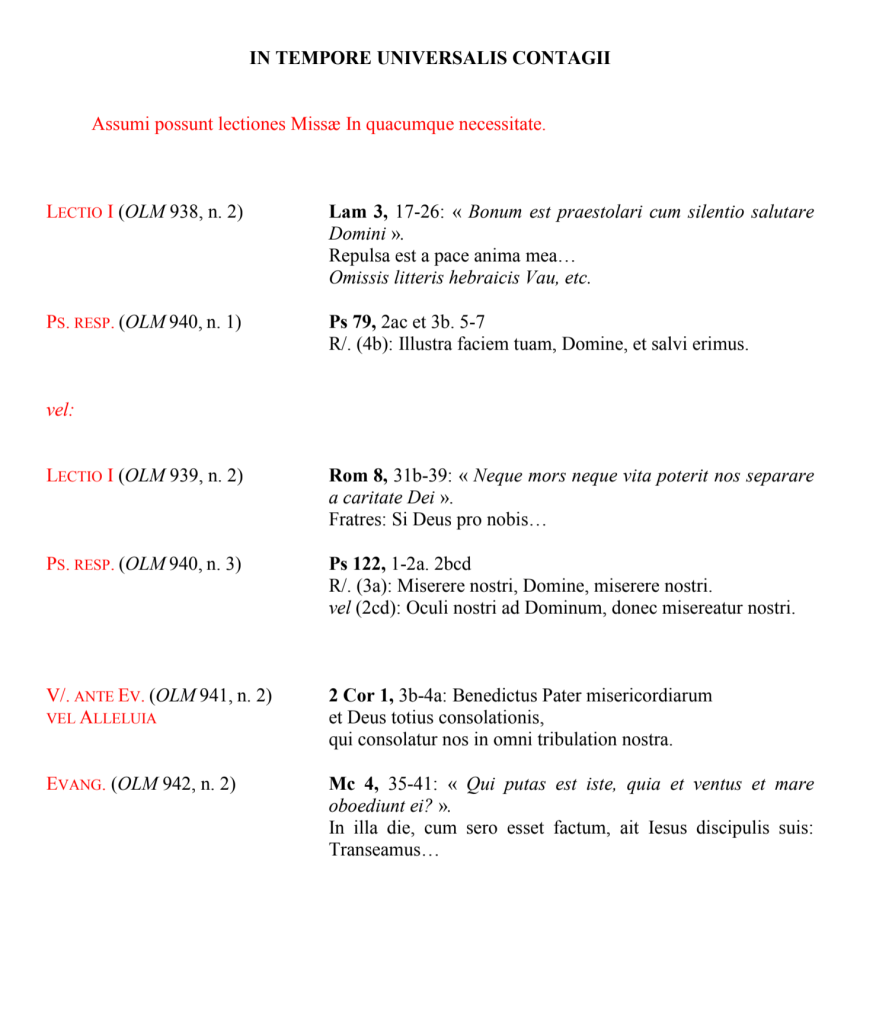NATURALLY I CLAIM NO CREDIT, for to do so would be a heinous crime against truth. However, having so recently lamented the omission in the modern missal of any votive mass for time of plague or pestilence, as there had been of old, there has emerged from Rome a decree instituting a votive Mass “in Time of Pandemic,” as well as an intercession for the same purpose in the Good Friday litany.
The Latin Mass texts and their official English translation, as well as the readings for the Mass, are below:





The Good Friday intercession is as follows:



The texts with approved translations in the principal languages can be downloaded for printing, the first link for the Mass texts, the second for Good Friday:
There are things about which to quibble. One is their specificity, viz. “the current pandemic.” It would have been preferable to keep the focus on plague and pestilence in general, as is traditional. The ultra-specificity in bidding prayers at Mass one often hears is more exclusive than inclusive. But that is another matter…
The more major quibble is the theology they manifest. Gone is any reference to sin or evil; clearly the authors will not countenance that pandemics, plagues and pestilences are things that could result from human deeds, or rather, misdeeds. Their failure to do so flies in the face of scripture which is rather clear on the matter. It is a pity, not least because in this season of Lent (to maintain the specificity the texts prefer) we are called above all to repent of our sins that we might not suffer their just consequences. But I touched on these theological issues in the previous post.
[UPDATE] The original version of the Latin prayer over the people had a typo, spotted by the eagle eyes of the New Liturgical Movement. The image above has been updated with the corrected image provided there. Some might wonder if, since all Masses at present, in Anglophone countries at least, are “private,” this is mindless pedantry. Speaking for myself, I am continuing to turn to the empty nave and praying over the people; they are there in spirit and by desire, and the prayers retain their value.
The documents are now downloadable from Divine Worship’s website, and include the correction.
“The more major quibble is the theology they manifest. Gone is any reference to sin or evil; clearly the authors will not countenance that pandemics, plagues and pestilences are things that could result from human deeds, or rather, misdeeds. Their failure to do so flies in the face of scripture which is rather clear on the matter.”
I was struck by that immediately on reading the text, even before I reached the bottom of your post, Father. I mean, these absences kind of hit you over the head…though they might not, for those with no familiarity traditional liturgy.
Wasn’t the Recordare, Domine Mass removed from the Roman Missal in the 1950’s?
You are most likely correct; I haven’t researched that beyond noticing that it is not in my 1962 altar missal. However, it is very much still included in my various people’s missals from throughout the 1960s, including, for example, my 1967 St Paul Daily Missal, and in the 1966 edition of the popular German Schott Messbuch. Even after the first reforms had begun it was still in the people’s missals. That fascinates me, I must say. Pax.